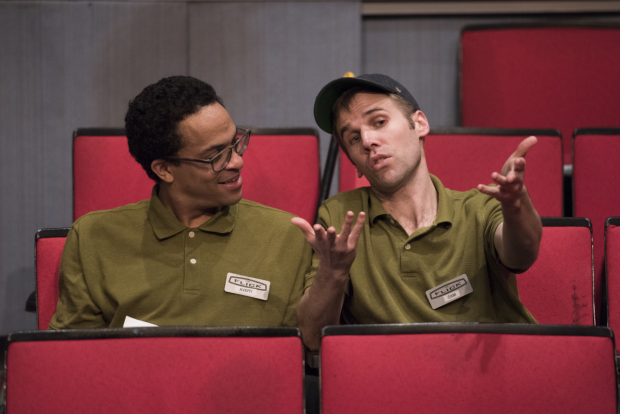The Flick

(© Margot Schulman)
As Signature Theatre's touching and funny Washington, D.C. premiere of The Flick shows, playwright Annie Baker is interested in the have-nots of the world, people whose speech is not fluid, but awkward, full of pauses, hesitations, and full stops. First staged in 2012, The Flick received the Pulitzer Prize in 2014 for its precisely drawn characters, imaginative setting, and complicated web of connections (instead of a more conventional plot) that begins to emerge among its characters.
Baker has the audience facing the empty seats of the Flick, a run-down movie theater located in Worcester County, Massachusetts. It is one of only a few movie houses left in the state that still employs a projectionist to run a 35-millimeter film projector. Other cinemas have already converted to digital projection, and rumor has it that the Flick may soon convert, too.
Two employees, Sam (Evan Casey) and Avery (Thaddeus McCants), clean up the theater after every show. Sam has been there for some time, so he shows the routine of sweeping and mopping to Avery, a new hire. Twenty-year-old Avery, a sensitive and squeamish soul, is horrified by the junk he finds between the rows of seats. Sam, in his mid-30s, is resigned to it all. In order to relieve their boredom, Avery and Sam play variations of Six Degrees of Kevin Bacon, a game at which Avery, being a brilliant film buff, is clearly the champion.
Projectionist Rose (Laura C. Harris) is an authoritative twentysomething who makes Avery nervous. With her long green hair and spiky personality, Rose has the best job at the Flick, and Sam is jealous that their boss didn't offer the position to him. He also has a crush on her. Rose, meanwhile, is attracted to the gentle Avery, and she tries desperately to prove how well-matched they are.
McCants is stunning as the shy, introverted Avery, an African-American who believes that his boss is a racist. In a phone call to his therapist, Avery admits that he doesn't know how to make friends. McCants makes Avery's fear and loneliness intensely credible.
Casey is excellent as Sam, a man who doesn't see any future for himself. When Avery asks him what he wants to be when he grows up, Sam says, "I am grown up." Throughout most of the play, Casey makes Sam's beloved Red Sox cap an extension of Sam's personality. When he is forced to take it off in Act 2, Casey almost seems diminished by several inches.
Harris plays the seductive Rose as a young woman who is, deep down, insecure about herself. Whether she tries to interest Sam and Avery in astrology or in a sexy dance, Harris beautifully captures Rose's dilemma: She's "super-duper sad" about the present, but very curious about her future.
Director Joe Calarco does a masterful job of keeping the play's tempo slow and steady without letting it drag. He also deftly leads the ensemble to find both subtle and outright humor in the script.
James Kronzer's authentic set design shows two banks of torn, tape-mended, red upholstered seats, above which is the projectionist's booth. Costume designer Frank Labovitz dresses Avery and Sam in oversize polo shirts and brown slacks. Rose wears jeans torn at the knee and a variety of tight T-shirts and loose blouses.
Baker's precise hyper-naturalism, the way she lets her characters slowly reveal themselves within the movie theater's claustrophobic setting, is wonderful to behold. By the end of The Flick, Baker has subtly taken on issues of hope, hopelessness, race, class, money, social justice, and boredom while keeping the audience riveted. Best of all, without a whiff of sentimentality, Baker has her characters leave the play in better condition than they were in when they entered.










